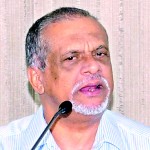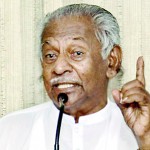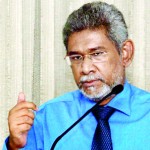Economic fallout from Geneva could worsen this year
View(s):Religious intrusion for the first time in the marketplace
By Quintus Perera
Sri Lanka’s loss at this week’s UN vote in Geneva and religious intrusion into the market place was the main focus of a discussion on Monday organized by the Sunday Times Business Club (STBC).
In all the crises building up in Sri Lanka, the Government appeared to be ‘sleeping’ and weak in its responses, panellists said.
Opening the discussion on Sri Lanka’s short-term future in “Politics, Economics and Astrology”, political scientist, writer and former diplomat Dayan Jayatillake said Sri Lanka would lose the US-backed resolution in Geneva on Sri Lanka by more votes than in 2012. (On Thursday, the resolution was passed with a majority of 12 votes against nine in 2012).
 |
 |
 |
| (Left to right ) Luxman Siriwardena, Piyasena Rathuwithana, Dayan Jayatillake | ||
He said for the first time in post independent Sri Lanka, ethno-religious forces have invaded the market place and exemplified it with a reference to the ‘Halal’ issue, which had distorted the functioning of the market place in a completely irrational way.
The most surprising (but not surprising to a few) comment came from well-known astrologer Piyasena Rathuwithana who said that planetary movements would affect the world, the country and the political leaders.
According to these changes, the Opposition Leader would become the second citizen in the country (after October), he said.
The comment threw a cynical response in the form of a question from Dr Jayatillake to Mr. Rathuwithana. “Isn’t the Opposition Leader already the second citizen,” asked the former ambassador to France and earlier the Geneva-based UN, who yesterday (March 23) launched his latest book ‘Long War, Cold Peace’.
The unique discussion held at the club’s host hotel, the Cinnamon Lakeside, Colombo, also included Laxman Siriwardene, Executive Director, Pathfinder Foundation who said there was unlikely to be any major changes in the economy this year but noted that there should be more focus towards private sector. Expressing concern over the level of corruption, he said that between 1956 and 1977 the corruption in the country has been at retail level but after 1977 it has grown to wholesale level.
He also expressed concern over the emergence of hardline Buddhist groups interfering in the marketplace. Mr. Rathuwithana’s comments drew interest and some hilarious moments particularly because lots of decisions in Sri Lanka – even economic ones – are made on astrological predictions. He analyzed the recent history of the world vis-à-vis Sri Lanka and noted how these planetary movements affected the world and how there were good time and bad times. He said that according to these movements Sri Lanka is moving towards stability.
Dr. Jayatillake said that a successful economy should have integrated production, an integrated market and an integrated workforce.
Ethno-religious fanaticism now raising its head would infuse fear that would defuse the economic integration. He asserted that these ‘extra-economic’ factors and the cartelization of resources and power would have a serious debilitating effect on the economy.
It would be worst when one considers that these extra-economic activities have state patronage, which in his view would not bring happy prospects to the country.
The vote against Sri Lanka would have spiraling repercussions on Sri Lanka and its economy particularly in trade, garment exports investment and migrant worker remittances, he said.
It would be both a barometer of Sri Lanka’s standing in the world and also a bill of health by the world system.
Countries like Vietnam and Myanmar which had worst situations than Sri Lanka were able to draw much more foreign investment than Sri Lanka, he said adding that the Commonwealth summit is another hurdle to overcome.
“Apart from Geneva and the Commonwealth Summit there are many small things against Sri Lanka happening in many parts of the world, all of which affects the country,” the former diplomat said. One of the hallmarks of prosperity of a country – a better middle-class – is not apparent in Sri Lanka.
Taking a dig at the United National Party, Dr. Jayatillake said Sri Lanka’s impasse in politics is because the political market place is not competitive.
He said that in the corporate sector if a company makes losses for 18 years it would be suicidal and the management would be pinned to the wall by its shareholders and the head removed. But such monopolistic political bankruptcy is visible in Sri Lanka. Monopoly in the political market place in Sri Lanka is rampant, he asserted.
Therefore his bitter concoction to remedy the ills of the country is to restore the equilibrium in politics by making the political market place competitive once again. The club is sponsored by Etisalat.
Follow @timesonlinelk
comments powered by Disqus



















